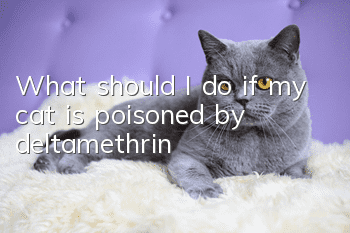What should I do if my cat is poisoned by deltamethrin?

Deltamethrin is an insecticide that helps control parasites such as fleas and ticks. Sadly, there have been many cases of cats being poisoned by deltamethrin, often caused by the cat being poisoned by deltamethrin unintentionally when removing fleas from the cat. Unlike dogs, cats lack the enzymes needed to detoxify drugs containing deltamethrin. Even small doses can quickly lead to poisoning, causing serious illness or death. Therefore, deltamethrin should never be used to remove lice and fleas on cats.
Why is deltamethrin dangerous for cats?
Cats’ unique physiological characteristics mean that they cannot break down deltamethrin. Even small doses can be toxic to cats. Cats' livers lack a key liver enzyme called hepatic glucuronosyltransferase. Therefore, deltamethrin cannot be decomposed, so a little bit of deltapermethrin will remain for a long time. To make matters worse, deltamethrin is fat-soluble and can be absorbed through the skin. The toxicity of deltamethrin to dogs and cats is different, which is why you'll find dog collars containing deltapermethrin in pet stores. These products are easily available, but owners are often unaware of their toxic risks to cats.
How did cats become poisoned by deltamethrin?
Sadly, the first way cats are poisoned is often because the scavenger does not realize the danger and uses a type of deltapermethrin specially prepared for dogs to remove fleas. Cat poisoning can also occur when cats are in close proximity to dogs whose fleas have just been treated with deltapermethrin. This can contaminate their own coat, and deltamethrin can be absorbed through the skin or when the cat grooms itself. Cats can also be poisoned if they lie on a dog's bed or sit on the same furniture. So don’t use any flea products containing deltamethrin on your cat.
Symptoms of deltamethrin poisoning in cats
What are the symptoms of deltamethrin poisoning in cats? What should I pay attention to? The speed and severity of poisoning symptoms often depend on the dose given and the concentration of the toxic ingredient. When exposed to small amounts, it can take up to three days for symptoms to appear. The first obvious symptom is likely to be that the cat looks restless, anxious, shaky, and as if he is drunk. Other symptoms include muscle twitches and tremors, and worrisome seizures.
Twitching
Muscle tremors
Dooling a lot
Walking and poor coordination
Pupillary dilation for no reason
Cat having epileptic seizure
Grumpy
What should be done immediately after a cat is poisoned by deltamethrin:
If you think your cat has been exposed to something containingDeltapermethrin, whether directly or indirectly, please take it to the pet hospital immediately. Even if there is no antidote, acting quickly can save your cat's life. The first step, which you can do at home, is to decontaminate the cat's fur as quickly as possible to minimize the damage. Wash your cat in warm water with dilute dish soap. Doing this helps reduce the amount of deltapermethrin absorbed through the skin, which can be the difference between life and death. After bathing, dry the cat and keep it warm before going to the nearest pet hospital.
Treatment of deltamethrin poisoning in cats
Veterinary treatment will depend on the extent of the cat’s poisoning, including but not limited to:
1. Intravenous infusion: This has several benefits. For example, most cats are too ill to eat or drink, so fluids prevent dehydration, which in turn protects the kidneys from working non-stop. Permethrin is fat-soluble, so it takes a while to flush out of the body, but intravenous fluids can help facilitate this.
2. Anti-epileptic drugs: Muscle tremors and twitches are exhausting and dangerous. A range of different medications may be necessary to promote muscle relaxation and limit the effects of seizures. In the most severely affected feline patients, general anesthesia and the insertion of a breathing tube may be needed to control the condition.
3. Medical care: Muscle contraction produces heat, and high fever is dangerous. Care includes monitoring the cat's body temperature and keeping the cat cool. In addition, cats that are too weak to stand need to be turned over regularly to prevent bedsores.
4. Lipid infusion: The latest innovation in treating permethrin toxicity is the use of lipid infusion. These drugs pull permethrin out of body fat and into the bloodstream for the kidneys to excrete in urine. But this treatment is often given during a cat's infancy and is not widely available.
If treated promptly, most cats will make a full recovery. For more severely poisoned cats, especially those whose seizures are more difficult to control, statistics show that 10-40% of cats poisoned by deltapermethrin do not survive even with veterinary treatment.
How to prevent deltamethrin poisoning in cats?
In this case, prevention is definitely better than cure. So, how can you ensure your cat doesn’t get poisoned? Quite simply, do not use deltamethrin products on your pets or in your home. Avoid products that use all pyrethrins (pyrethrins, permethrin, or pyrethroids) to minimize the risk of toxicity.
Don’t put dog flea products on cats
If you have cats or dogs at home, you can reduce your risk by choosing a deltamethrin-free flea treatment. It's also a good idea to separate dogs and cats until any topical flea treatment is dry. be sureRead the active ingredients and warning labels on the package. This includes when you're shopping online - make sure you know what the active ingredients are and choose deltapermethrin-free products. If you're shopping for an off-the-shelf flea treatment at the store, buy a breed-specific product that's appropriate for your cat's weight and age. Kittens may be more sensitive to flea treatments than adult cats, so it's important to use the correct dosage for their age.
- What causes vomiting in cats? How to prevent and treat vomiting in cats?
- How to train a British shorthair cat? It’s actually very simple!
- Why is the cat screaming?
- Are there any long-haired Siamese cats?
- Reasons why cats squat
- Things to note when buying a cat litter box
- What happens if a cat eats too much grass?
- How to tell if a cat has fleas
- After a cat is "spoiled", it will have these major characteristics. How many of these characteristics does your cat have?
- My son and I’s journey of raising cats



